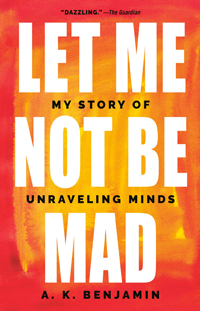 A.K. Benjamin, Let Me Not Be Mad: My Story of Unraveling Minds (New York: Dutton, 2019), 291pp.
A.K. Benjamin, Let Me Not Be Mad: My Story of Unraveling Minds (New York: Dutton, 2019), 291pp.
This medical memoir by the British neurologist A.K. Benjamin (a pseudonym) begins conventionally enough, and reminds one of similar books by Oliver Sacks, Atul Gawande, and especially the neurosurgeon Henry Marsh (Do No Harm; Stories of Life, Death, and Brain Surgery, 2014). In all these books, the physician draws upon the case studies of his patients to explore the imperfect science (and art) of practicing medicine.
And so we meet Benjamin's patients who have lost their speech, can't raise their arm, forget the names of close friends, lose their daily functions, and can't remember where they parked the car. Others struggle with dementia, epilepsy, or traumatic brain injury. It is his job to take the "measure of their mind," but that task, he insists, is inherently "contentious, philosophically, ethically, statistically." There is no "outside" and objective view to be had, just the two subjective perspectives of patient and doctor. This leads to candid ruminations about Benjamin's craft, the frustrations of the medical bureaucracy, philosophic questions about the relationship between mind and body, the mysteriously complex and fragile nature of the self, the asymmetry in the doctor-patient relationship, misdiagnosis, and, in some of his patients, the netherlands of madness. And so, he does his best to "unravel" their minds.
About half way through the book, though, the doctor becomes the patient. The third person case studies morph into first person autobiography, as Benjamin's own mind unravels. He burns through his marriage, and is alienated from his kids. He abuses alcohol, cries in public, does an Ironman triathlon for all the wrong reasons, enters co-dependent relationships, does a tour in a Buddhist monastery, and struggles with being "para-homeless." A patient registers a complaint against him. It takes him ten minutes to button his shirt. "My own sense of self was untethering," he writes. With his life in free fall, struggling with his own mental illness, he searches for healing, just as he struggled to help his own patients, although by the end of the book we appreciate how and why that's not as simple as one might hope.
So, what began as a series of clinical anecdotes becomes a personal confession. More than that, Benjamin calls us to empathy for the elusive and complex nature of mental health and wholeness. Be kind to all, wrote the first-century Philo, for everyone you meet is fighting a great battle.
Dan Clendenin: dan@journeywithjesus.net


